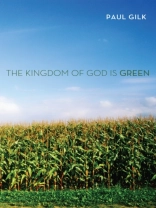In the early 1970s, living in inner-city St. Louis, Paul Gilk asked his friends to explain why small farms were dying. The answers did not satisfy. Years of study followed.
Through the reading of history, Gilk began to grasp the origins of both horticulture and agriculture, their blossoming into Neolithic agrarian village culture, and the impoundment of the agrarian village by bandit ‘aristocrats’ at the formation of what we now call civilization. Getting a grip on the relationship between agriculture and civilization was one thing; but, as a person strongly influenced by Gospel stories, Gilk also wanted to know what the connection might be between the ‘kingdom of God’ proclamation in the canonical Gospels and the peasant world from which Jesus arose.
Aided in his thinking by the works of biblical scholars Marcus Borg and John Dominic Crossan, Gilk began to realize that the ‘kingdom of God’ was both a harkening back to the peace and freedom of precivilized agrarian village and a revolutionary anticipation of a postcivilized village-mindedness organized organically on the basis of radical servanthood and radical stewardship. We are, Gilk says, entering the dawn of this Green culture simultaneously with the deepening of civilized world disaster.
Yazar hakkında
Paul Gilk is an independent intellectual who lives in the woods of northern Wisconsin. A long practitioner of ‘voluntary poverty, ‘ he chose a life of deliberate retreat by building and living in a small cabin for nearly twenty years before reconstructing a nineteenth-century log house, both homes without electricity or running water. He is married to a Swiss citizen, Susanna Juon. Between them, they have seven grown children.







![Örtmek Brian Schrag & Julisa Rowe: Community Arts for God's Purposes [Chinese] 貼近神心意的社群藝術 Örtmek Brian Schrag & Julisa Rowe: Community Arts for God's Purposes [Chinese] 貼近神心意的社群藝術](https://static.worldofdigitals.com/thumb_webp/740/9781645083740.webp)




